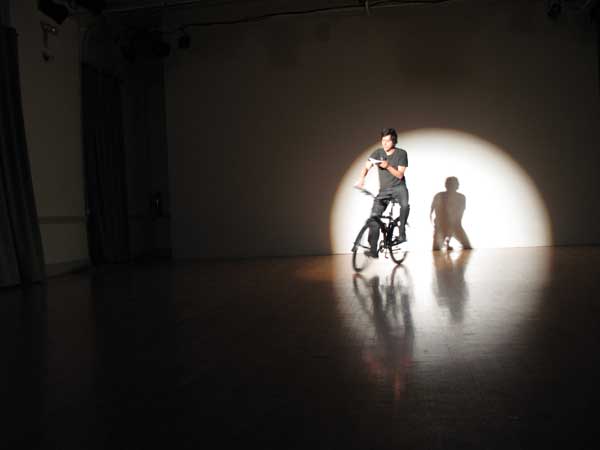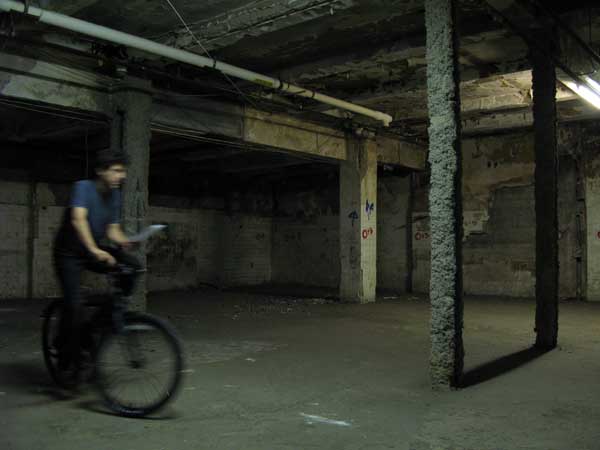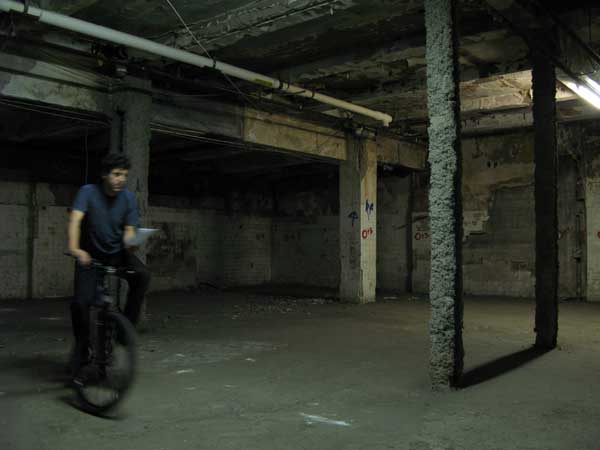The Bicycle Artist, 1924/2007
A Bicycle Performance with the reworked text The Hunger Artist by Franz Kaftka, 1924
Based on the famous text The Hunger Artist by Franz Kafka written in1924, Rainer Ganahl will perform an adaptation of the text, entitled The Bicycle Artist (www.ganahl.info/bicycleartist.html). The piece is presented with a special bicycle choreography.
This piece was first filmed in a basement that hasn't been touched for many decades. It was first performed to the public in a darkened theater space in lower Manhattan for the event:
boundless, curated by cecillia allemani, jame kim (thrust project)
for the night of the opening of the NEW MUSEUM
(I used a DAHON foldable bike)
see actual text below:
click to see the first 9 minutes of a 30 minute video: the bicycle artist, 1924/2007
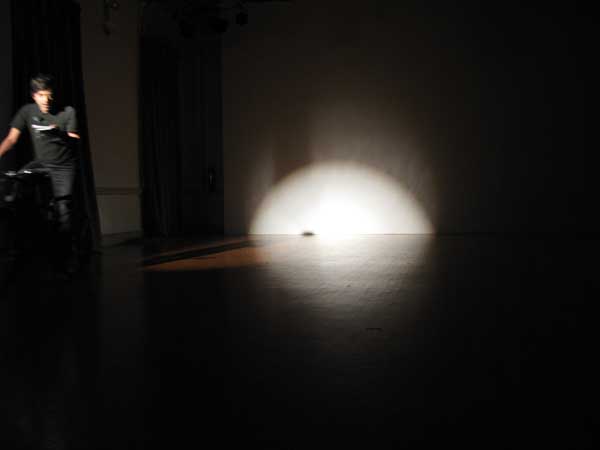
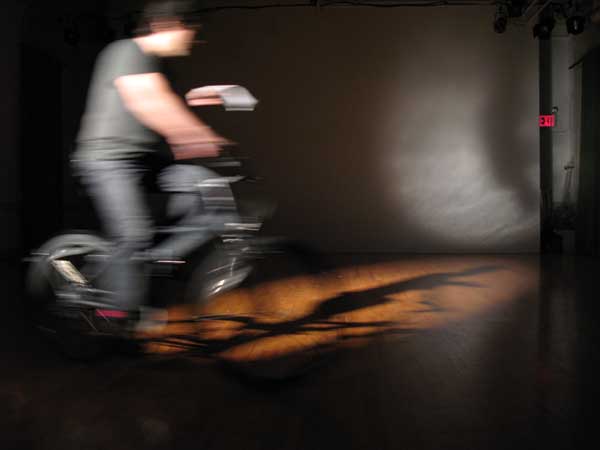
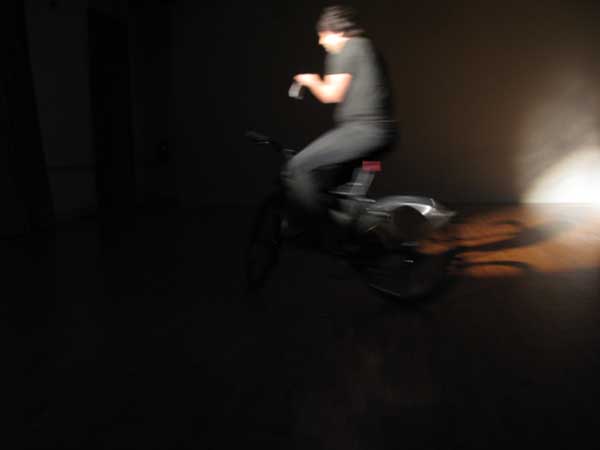
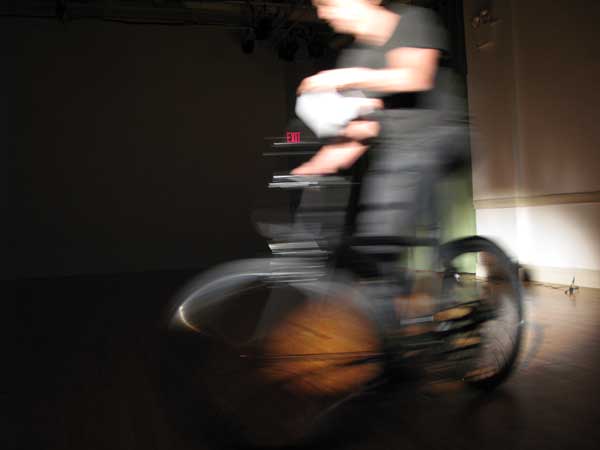
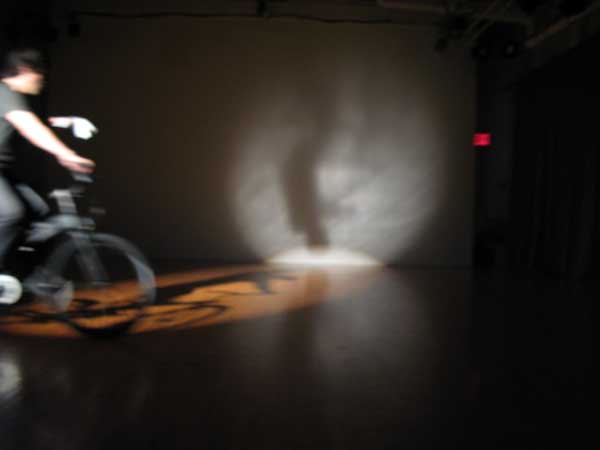
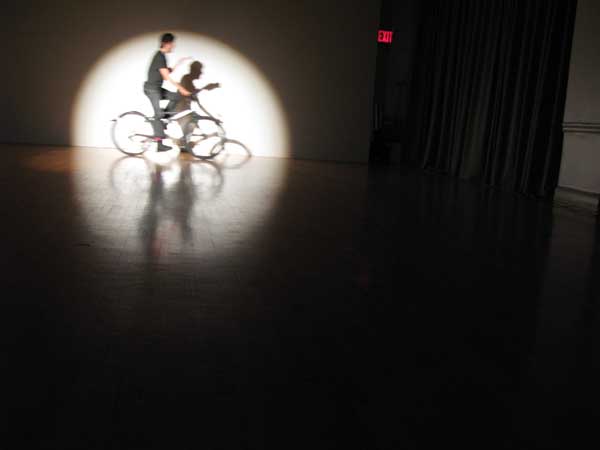
here is a private version filmed in sinsiter basement in NYC.
click to download hi res image
click to see the first 9 minutes of a 30 minute video: the bicycle artist, 1924/2007
note: this is a wide screen movie filmed on HDVD: the quicktime rending here cuts quite a bit on both sides of the screen:
here are two actual HDVD screen shuts
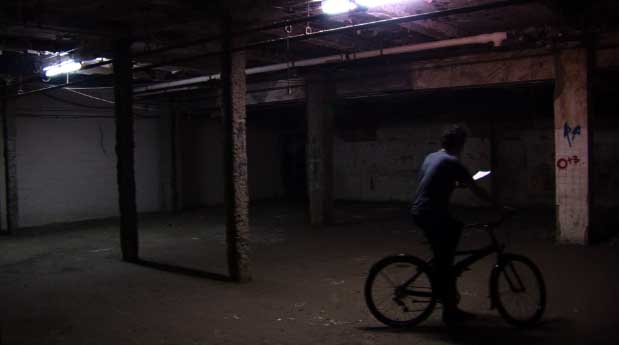
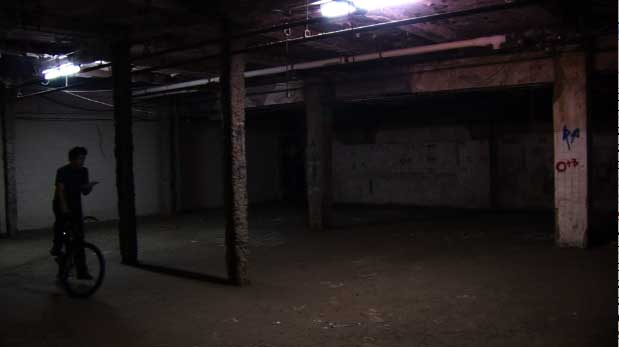
Rainer Ganahl, The Bicycle Artists, 2007
BicyclePerformance with text rewritten after Franz Kaftka's The Hunger Artist, 1924
In the last decades interest in bicycle artists has declined considerably. Whereas in earlier days there was good money to be earned putting on major productions of this sort under one’s own management, nowadays that is totally impossible. Those were different times. Back then the bicycle artist captured the attention of the entire city. From day to day while the bicycling lasted, participation increased. Everyone wanted to see the bicycle artist at least daily. During the final days there were people with subscription tickets who sat all day in front of the small barred cage. And there were even viewing hours at night, their impact heightened by torchlight. On fine days the cage was dragged out into the open air, and then the bicycle artist was put on display particularly for the children. While for grown-ups the bicycle artist was often merely a joke, something they participated in because it was fashionable, the children looked on amazed, their mouths open, holding each other’s hands for safety, as he sat there on the saddle in a black tights, looking pale, with his ribs sticking out prominently, sometimes nodding politely, answering questions with a forced smile, even sticking his arm out through the bars to let people feel how emaciated he was, but then completely sinking back into himself, so that he paid no attention to anything, not even to what was so important to him, the striking of the clock, which was the single furnishing in the cage, merely looking out in front of him with his eyes almost shut and now and then sipping from a tiny glass of water to moisten his lips.
Apart from the changing groups of spectators there were also constant observers chosen by the public—strangely enough they were usually butchers—who, always three at a time, were given the task of observing the bicycle artist day and night, so that he didn’t get something to eat in some secret manner. It was, however, merely a formality, introduced to reassure the masses, for those who understood knew well enough that during the period of bicycling the bicycle artist would never, under any circumstances, have eaten the slightest thing, not even if compelled by force. The honour of his art forbade it. Naturally, none of the watchers understood that. Sometimes there were nightly groups of watchers who carried out their vigil very laxly, deliberately sitting together in a distant corner and putting all their attention into playing cards there, clearly intending to allow the bicycle artist a small refreshment, which, according to their way of thinking, he could get from some secret supplies. Nothing was more excruciating to the bicycle artist than such watchers. They depressed him. They made his bicycling terribly difficult. Sometimes he overcame his weakness and sang during the time they were observing, for as long as he could keep it up, to show people how unjust their suspicions about him were. But that was little help. For then they just wondered among themselves about his skill at being able to eat even while singing. He much preferred the observers who sat down right against the bars and, not satisfied with the dim backlighting of the room, illuminated him with electric flashlights. The glaring light didn’t bother him in the slightest. Generally he couldn’t sleep at all, and he could always doze under any lighting and at any hour, even in an overcrowded, noisy auditorium. With such observers, he was very happily prepared to spend the entire night without sleeping. He was very pleased to joke with them, to recount stories from his nomadic life and then, in turn, to listen their stories—doing everything just to keep them awake, so that he could keep showing them once again that he had nothing to eat in his cage and that he was bicycling as none of them could.
He was happiest, however, when morning came and a lavish breakfast was brought for them at his own expense, on which they hurled themselves with the appetite of healthy men after a hard night’s work without sleep. True, there were still people who wanted to see in this breakfast an unfair means of influencing the observers, but that was going too far, and if they were asked whether they wanted to undertake the observers’ night shift for its own sake, without the breakfast, they excused themselves. But nonetheless they stood by their suspicions.
However, it was, in general, part of bicycling that these doubts were inextricably associated with it. For, in fact, no one was in a position to spend time watching the bicycle artist every day and night, so no one could know, on the basis of his own observation, whether this was a case of truly uninterrupted, flawless bicycling. The bicycle artist himself was the only one who could know that and, at the same time, the only spectator capable of being completely satisfied with his own bicycling. But the reason he was never satisfied was something different. Perhaps it was not bicycling at all which made him so very emaciated that many people, to their own regret, had to stay away from his performance, because they couldn’t bear to look at him. For he was also so skeletal out of dissatisfaction with himself, because he alone knew something that even initiates didn’t know—how easy it was to bicycle. It was the easiest thing in the world. About this he did not remain silent, but people did not believe him. At best they thought he was being modest. Most of them, however, believed he was a publicity seeker or a total swindler, for whom, at all events, bicycling was easy, because he understood how to make it easy, and then had the nerve to half admit it. He had to accept all that. Over the years he had become accustomed to it. But this dissatisfaction kept gnawing at his insides all the time and never yet—and this one had to say to his credit—had he left the cage of his own free will after any period of bicycling.
The impresario had set the maximum length of time for the bicycling at forty days—he would never allow the bicycling go on beyond that point, not even in the cosmopolitan cities. And, in fact, he had a good reason. Experience had shown that for about forty days one could increasingly whip up a city’s interest by gradually increasing advertising, but that then the people turned away—one could demonstrate a significant decline in popularity. In this respect, there were, of course, small differences among different towns and among different countries, but as a rule it was true that forty days was the maximum length of time.
So then on the fortieth day the door of the cage—which was covered with flowers—was opened, an enthusiastic audience filled the amphitheatre, a military band played, two doctors entered the cage, in order to take the necessary measurements of the bicycle artist, the results were announced to the auditorium through a megaphone, and finally two young ladies arrived, happy about the fact that they were the ones who had just been selected by lot, seeking to lead the bicycle artist down a couple of steps out of the cage, where on a small table a carefully chosen hospital meal was laid out. And at this moment the bicycle artist always fought back. Of course, he still freely laid his bony arms in the helpful outstretched hands of the ladies bending over him, but he did not want to stand up. Why stop right now after forty days? He could have kept going for even longer, for an unlimited length of time. Why stop right now, when he was in his best form, indeed, not yet even in his best bicycling form? Why did people want to rob him of the fame of bicycling longer, not just so that he could become the greatest bicycle artist of all time, which he probably was already, but also so that he could surpass himself in some unimaginable way, for he felt there were no limits to his capacity for bicycling. Why did this crowd, which pretended to admire him so much, have so little patience with him? If he kept going and kept bicycling longer, why would they not tolerate it? Then, too, he was tired and felt good sitting in the settle. Now he was supposed to stand up straight and tall and go to eat, something which, when he just imagined it, made him feel nauseous right away. With great difficulty he repressed mentioning this only out of consideration for the women. And he looked up into the eyes of these women, apparently so friendly but in reality so cruel, and shook his excessively heavy head on his feeble neck.
But then happened what always happened. The impresario came and in silence—the music made talking impossible—raised his arms over the bicycle artist, as if inviting heaven to look upon its work here on the straw, this unfortunate martyr, something the bicycle artist certainly was, only in a completely different sense, then grabbed the bicycle artist around his thin waist, in the process wanting with his exaggerated caution to make people believe that here he had to deal with something fragile, and handed him over—not without secretly shaking him a little, so that the bicycle artist’s legs and upper body swung back and forth uncontrollably—to the women, who had in the meantime turned as pale as death. At this point, the bicycle artist endured everything. His head lay on his chest—it was as if it had inexplicably rolled around and just stopped there—his body was arched back, his legs, in an impulse of self-preservation, pressed themselves together at the knees, but scraped the ground, as if they were not really on the floor but were looking for the real ground, and the entire weight of his body, admittedly very small, lay against one of the women, who appealed for help with flustered breath, for she had not imagined her post of honour would be like this, and then stretched her neck as far as possible, to keep her face from the least contact with the bicycle artist, but then, when she couldn’t manage this and her more fortunate companion didn’t come to her assistance but trembled and remained content to hold in front of her the bicycle artist’s hand, that small bundle of knuckles, she broke into tears, to the delighted laughter of the auditorium, and had to be relieved by an attendant who had been standing ready for some time. Then came the meal. The impresario put a little food into the mouth of the bicycle artist, now half unconscious, as if fainting, and kept up a cheerful patter designed to divert attention away from the bicycle artist’s condition. Then a toast was proposed to the public, which was supposedly whispered to the impresario by the bicycle artist, the orchestra confirmed everything with a great fanfare, people dispersed, and no one had the right to be dissatisfied with the event, no one except the bicycle artist—he was always the only one.
He lived this way, taking small regular breaks, for many years, apparently in the spotlight, honoured by the world, but for all that his mood was usually gloomy, and it kept growing gloomier all the time, because no one understood how to take him seriously. But how was he to find consolation? What was there left for him to wish for? And if a good-natured man who felt sorry for him ever wanted to explain to him that his sadness probably came from his bicycling , then it could happen that the bicycle artist responded with an outburst of rage and began to shake the bars like an animal, frightening everyone. But the impresario had a way of punishing moments like this, something he was happy to use. He would make an apology for the bicycle artist to the assembled public, conceding that the irritability had been provoked only by his bicycling , something quite intelligible to well-fed people and capable of excusing the behaviour of the bicycle artist without further explanation. From there he would move on to speak about the equally hard to understand claim of the bicycle artist that he could go on bicycling for much longer than he was doing. He would praise the lofty striving, the good will, and the great self-denial no doubt contained in this claim, but then would try to contradict it simply by producing photographs, which were also on sale, for in the pictures one could see the bicycle artist on the fortieth day of his fast, in bed, almost dead from exhaustion. Although the bicycle artist was very familiar with this perversion of the truth, it always strained his nerves again and was too much for him. What was a result of the premature ending of the fast people were now proposing as its cause! It was impossible to fight against this lack of understanding, against this world of misunderstanding. In good faith he always listened eagerly to the impresario at the bars of his cage, but each time, once the photographs came out, he would let go of the bars and, with a sigh, sink back into the straw, and a reassured public could come up again and view him.
When those who had witnessed such scenes thought back on them a few years later, often they were unable to understand themselves. For in the meantime that change mentioned above had set it. It happened almost immediately. There may have been more profound reasons for it, but who bothered to discover what they were? At any rate, one day the pampered bicycle artist saw himself abandoned by the crowd of pleasure seekers, who preferred to stream to other attractions. The impresario chased around half of Europe one more time with him, to see whether he could still re-discover the old interest here and there. It was all futile. It was as if a secret agreement against the bicycling performances had developed everywhere. Naturally, it couldn’t really have happened all at once, and people later remembered some things which in the days of intoxicating success they hadn’t paid sufficient attention to, some inadequately suppressed indications, but now it was too late to do anything to counter them. Of course, it was certain that the popularity of bicycling would return once more someday, but for those now alive that was no consolation. What was the bicycle artist to do now? A man whom thousands of people had cheered on could not display himself in show booths at small fun fairs. The bicycle artist was not only too old to take up a different profession, but was fanatically devoted to bicycling more than anything else. So he said farewell to the impresario, an incomparable companion on his life’s road, and let himself be hired by a large circus. In order to spare his own feelings, he didn’t even look at the terms of his contract at all.
A large circus with its huge number of men, animals, and gimmicks, which are constantly being let go and replenished, can use anyone at any time, even a bicycle artist, provided, of course, his demands are modest. Moreover, in this particular case it was not only the bicycle artist himself who was engaged, but also his old and famous name. In fact, given the characteristic nature of his art, which was not diminished by his advancing age, one could never claim that a worn out artist, who no longer stood at the pinnacle of his ability, wanted to escape to a quiet position in the circus. On the contrary, the bicycle artist declared that he could bicycle just as well as in earlier times—something that was entirely credible. Indeed, he even affirmed that if people would let him do what he wanted—and he was promised this without further ado—he would really now legitimately amaze the world for the first time, an assertion which, however, given the mood of the time, which the bicycle artist in his enthusiasm easily overlooked, only brought smiles from the experts.
However, basically the bicycle artist had not forgotten his sense of the way things really were, and he took it as self-evident that people would not set him and his cage up as the star attraction somewhere in the middle of the arena, but would move him outside in some other readily accessible spot near the animal stalls. Huge brightly painted signs surrounded the cage and announced what there was to look at there. During the intervals in the main performance, when the general public pushed out towards the menagerie in order to see the animals, they could hardly avoid moving past the bicycle artist and stopping there a moment. They would perhaps have remained with him longer, if those pushing up behind them in the narrow passage way, who did not understand this pause on the way to the animal stalls they wanted to see, had not made a longer peaceful observation impossible. This was also the reason why the bicycle artist began to tremble at these visiting hours, which he naturally used to long for as the main purpose of his life. In the early days he could hardly wait for the pauses in the performances. He had looked forward with delight to the crowd pouring around him, until he became convinced only too quickly—and even the most stubborn, almost deliberate self-deception could not hold out against the experience—that, judging by their intentions, most of these people were, again and again without exception, only visiting the menagerie. And this view from a distance still remained his most beautiful moment. For when they had come right up to him, he immediately got an earful from the shouting of the two steadily increasing groups, the ones who wanted to take their time looking at the bicycle artist, not with any understanding but on a whim or from mere defiance—for him these ones were soon the more painful—and a second group of people whose only demand was to go straight to the animal stalls.
Once the large crowds had passed, the late comers would arrive, and although there was nothing preventing these people any more from sticking around for as long as they wanted, they rushed past with long strides, almost without a sideways glance, to get to the animals in time. And it was an all-too-rare stroke of luck when the father of a family came by with his children, pointed his finger at the bicycle artist, gave a detailed explanation about what was going on here, and talked of earlier years, when he had been present at similar but incomparably more magnificent performances, and then the children, because they had been inadequately prepared at school and in life, always stood around still uncomprehendingly. What was bicycling to them? But nonetheless the brightness of the look in their searching eyes revealed something of new and more gracious times coming. Perhaps, the bicycle artist said to himself sometimes, everything would be a little better if his location were not quite so near the animal stalls. That way it would be easy for people to make their choice, to say nothing of the fact that he was very upset and constantly depressed by the stink from the stalls, the animals’ commotion at night, the pieces of raw meat dragged past him for the carnivorous beasts, and the roars at feeding time. But he did not dare to approach the administration about it. In any case, he had the animals to thank for the crowds of visitors among whom, here and there, there could be one destined for him. And who knew where they would hide him if he wished to remind them of his existence and, along with that, of the fact that, strictly speaking, he was only an obstacle on the way to the menagerie.
A small obstacle, at any rate, a constantly diminishing obstacle. People got used to the strange notion that in these times they would want to pay attention to a bicycle artist, and with this habitual awareness the judgment on him was pronounced. He might bicycle as well as he could—and he did—but nothing could save him any more. People went straight past him. Try to explain the art of bicycling to anyone! If someone doesn’t feel it, then he cannot be made to understand it. The beautiful signs became dirty and illegible. People tore them down, and no one thought of replacing them. The small table with the number of days the bicycling had lasted, which early on had been carefully renewed every day, remained unchanged for a long time, for after the first weeks the staff grew tired of even this small task. And so the bicycle artist kept bicycling on and on, as he once had dreamed about in earlier times, and he had no difficulty succeeding in achieving what he had predicted back then, but no one was counting the days—no one, not even the bicycle artist himself, knew how great his achievement was by this point, and his heart grew heavy. And when once in a while a person strolling past stood there making fun of the old number and talking of a swindle, that was in a sense the stupidest lie which indifference and innate maliciousness could invent, for the bicycle artist was not being deceptive—he was working honestly—but the world was cheating him of his reward.
Many days went by once more, and this, too, came to an end. Finally the cage caught the attention of a supervisor, and he asked the attendant why they had left this perfectly useful cage standing here unused with rotting straw inside. Nobody knew, until one man, with the help of the table with the number on it, remembered the bicycle artist. They pushed the straw around with a pole and found the bicycle artist in there. “Are you still bicycling ?” the supervisor asked. “When are you finally going to stop?” “Forgive me everything,” whispered the bicycle artist. Only the supervisor, who was pressing his ear up against the cage, understood him. “Certainly,” said the supervisor, tapping his forehead with his finger in order to indicate to the spectators the state the bicycle artist was in, “we forgive you.” “I always wanted you to admire my bicycling ,” said the bicycle artist. “But we do admire it,” said the supervisor obligingly. “But you shouldn’t admire it,” said the bicycle artist. “Well then, we don’t admire it,” said the supervisor, “but why shouldn’t we admire it?” “Because I had to bicycle . I can’t do anything else,” said the bicycle artist. “Just look at you,” said the supervisor, “why can’t you do anything else?” “Because,” said the bicycle artist, lifting his head a little and, with his lips pursed as if for a kiss, speaking right into the supervisor’s ear so that he wouldn’t miss anything, “because I couldn’t find a food which I enjoyed. If had found that, believe me, I would not have made a spectacle of myself and would have eaten to my heart’s content, like you and everyone else.” Those were his last words, but in his failing eyes there was the firm, if no longer proud, conviction that he was continuing to bicycle.
“All right, tidy this up now,” said the supervisor. And they buried the bicycle artist along with the straw. But in his cage they put a young panther. Even for a person with the dullest mind it was clearly refreshing to see this wild animal throwing itself around in this cage, which had been dreary for such a long time. It lacked nothing. Without thinking about it for any length of time, the guards brought the animal food. It enjoyed the taste and never seemed to miss its freedom. This noble body, equipped with everything necessary, almost to the point of bursting, also appeared to carry freedom around with it. That seem to be located somewhere or other in its teeth, and its joy in living came with such strong passion from its throat that it was not easy for spectators to keep watching. But they controlled themselves, kept pressing around the cage, and had no desire to move on.
Der Fahrradkünstler - Nach Franz Kafka's der Hungerkünstler, 1924/2008
eine Fahrradperformance / schwaebisch hall, 14. juni 2008
umgeschriebener text siehe unten
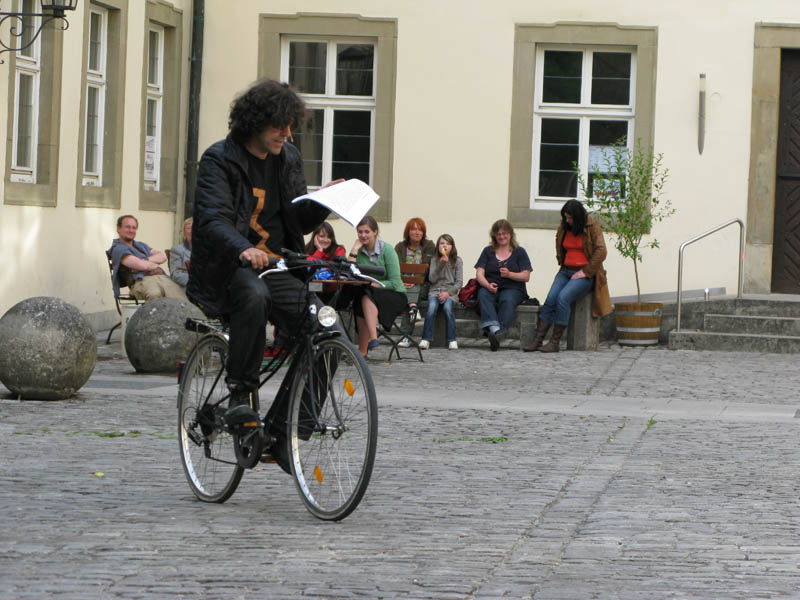
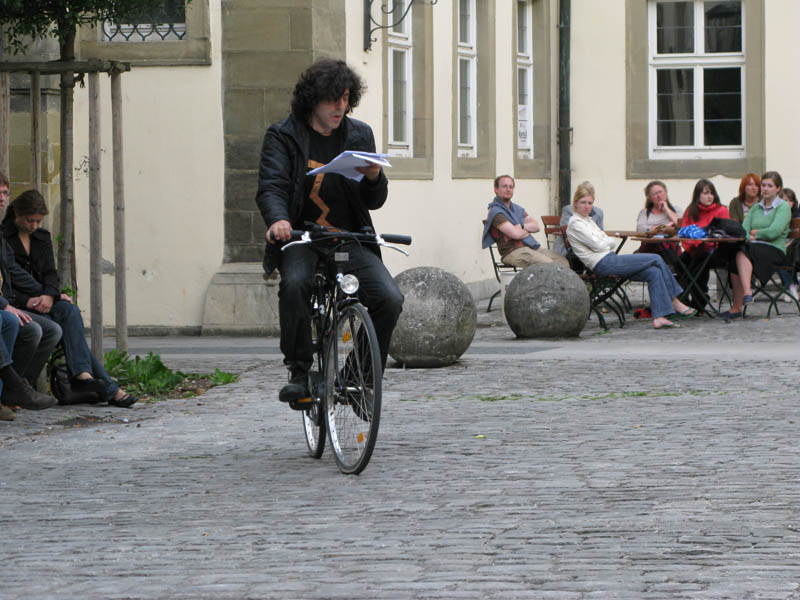
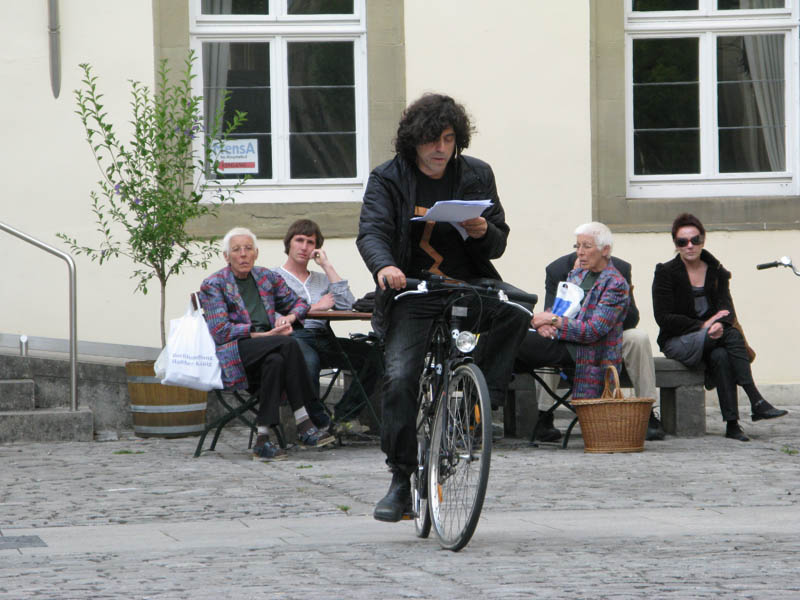
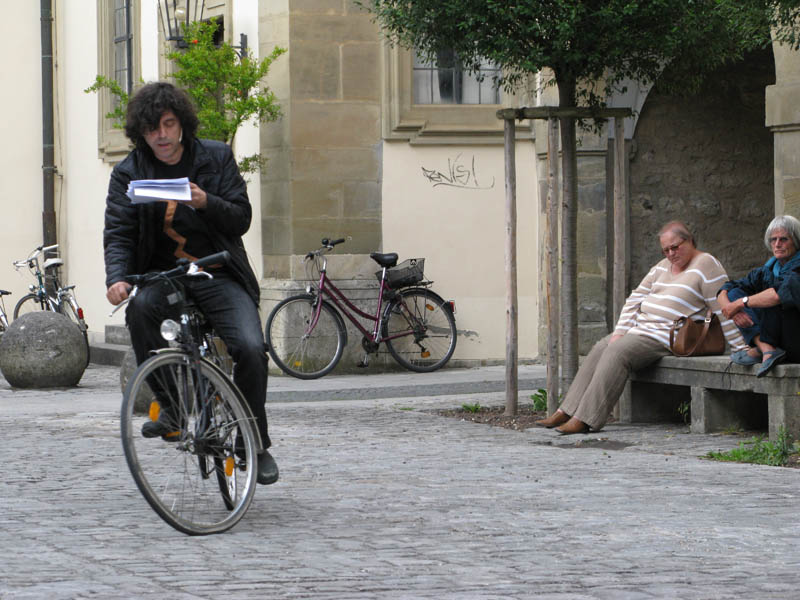
Franz Kafka
Ein Fahrradkünstler -- text umgeschrieben von Rainer Ganahl - english version
In den letzten Jahrzehnten ist das Interesse an Fahrradkünstlern sehr zurückgegangen. Während es sich früher gut lohnte, große derartige Vorführungen in eigener Regie zu veranstalten, ist dies heute völlig unmöglich. Es waren andere Zeiten. Damals beschäftigte sich die ganze Stadt mit dem Fahrradkünstler; von Fahrradtag zu Fahrradtag stieg die Teilnahme; jeder wollte den Fahrradkünstler zumindest einmal täglich sehn; an den spätern Tagen gab es Abonnenten, welche tagelang vor dem kleinen Gitterkäfig saßen; auch in der Nacht fanden Besichtigungen statt, zur Erhöhung der Wirkung bei Fackelschein; an schönen Tagen wurde der Käfig ins Freie getragen, und nun waren es besonders die Kinder, denen der Fahrradkünstler gezeigt wurde; während er für die Erwachsenen oft nur ein Spaß war, an dem sie der Mode halber teilnahmen, sahen die Kinder staunend, mit offenem Mund, der Sicherheit halber einander bei der Hand haltend, zu, wie er bleich, im schwarzen Trikot, mit mächtig vortretenden Rippen, sogar einen Sessel verschmähend, auf hingestreutem Stroh saß, einmal höflich nickend, angestrengt lächelnd Fragen beantwortete, auch durch das Gitter den Arm streckte, um seine Magerkeit befühlen zu lassen, dann aber wieder ganz in sich selbst versank, um niemanden sich kümmerte, nicht einmal um den für ihn so wichtigen Schlag der Uhr, die das einzige Möbelstück des Käfigs war, sondern nur vor sich hinsah mit fast geschlossenen Augen und hie und da aus einem winzigen Gläschen Wasser nippte, um sich die Lippen zu feuchten.
Außer den wechselnden Zuschauern waren auch ständige, vom Publikum gewählte Wächter da, merkwürdigerweise gewöhnlich Fleischhauer, welche, immer drei gleichzeitig, die Aufgabe hatten, Tag und Nacht den Fahrradkünstler zu beobachten, damit er nicht etwa auf irgendeine heimliche Weise doch Nahrung zu sich nehme. Es war das aber lediglich eine Formalität, eingeführt zur Beruhigung der Massen, denn die Eingeweihten wußten wohl, daß der Fahrradkünstler während der Fahrradzeit niemals, unter keinen Umständen, selbst unter Zwang nicht, auch das geringste nur gegessen hätte; die Ehre seiner Kunst verbot dies. Freilich, nicht jeder Wächter konnte das begreifen, es fanden sich manchmal nächtliche Wachgruppen, welche die Bewachung sehr lax durchführten, absichtlich in eine ferne Ecke sich zusammensetzten und dort sich ins Kartenspiel vertieften, in der offenbaren Absicht, dem Fahrradkünstler eine kleine Erfrischung zu gönnen, die er ihrer Meinung nach aus irgendwelchen geheimen Vorräten hervorholen konnte. Nichts war dem Fahrradkünstler quälender als solche Wächter; sie machten ihn trübselig; sie machten ihm das Fahrradfahren entsetzlich schwer; manchmal überwand er seine Schwäche und sang während dieser Wachzeit, solange er es nur aushielt, um den Leuten zu zeigen, wie ungerecht sie ihn verdächtigten. Doch half das wenig; sie wunderten sich dann nur über seine Geschicklichkeit, selbst während des Singens zu essen. Viel lieber waren ihm die Wächter, welche sich eng zum Gitter setzten, mit der trüben Nachtbeleuchtung des Saales sich nicht begnügten, sondern ihn mit den elektrischen Taschenlampen bestrahlten, die ihnen der Impresario zur Verfügung stellte. Das grelle Licht störte ihn gar nicht, schlafen konnte er ja überhaupt nicht, und ein wenig hindämmern konnte er immer, bei jeder Beleuchtung und zu jeder Stunde, auch im übervollen, lärmenden Saal. Er war sehr gerne bereit, mit solchen Wächtern die Nacht gänzlich ohne Schlaf zu verbringen; er war bereit, mit ihnen zu scherzen, ihnen Geschichten aus seinem Wanderleben zu erzählen, dann wieder ihre Erzählungen anzuhören, alles nur, um sie wachzuhalten, um ihnen immer wieder zeigen zu können, daß er nichts Eßbares im Käfig hatte und daß er radelte, wie keiner von ihnen es könnte. Am glücklichsten aber war er, wenn dann der Morgen kam und ihnen auf seine Rechnung ein überreiches Frühstück gebracht wurde, auf das sie sich warfen mit dem Appetit gesunder Männer nach einer mühevoll durchwachten Nacht. Es gab zwar sogar Leute, die in diesem Frühstück eine ungebührliche Beeinflussung der Wächter sehen wollten, aber das ging doch zu weit, und wenn man sie fragte, ob etwa sie nur um der Sache willen ohne Frühstück die Nachtwache übernehmen wollten, verzogen sie sich, aber bei ihren Verdächtigungen blieben sie dennoch.
Dieses allerdings gehörte schon zu den vom Radeln überhaupt nicht zu trennenden Verdächtigungen. Niemand war ja imstande, alle die Tage und Nächte beim Fahrradkünstler ununterbrochen als Wächter zu verbringen, niemand also konnte aus eigener Anschauung wissen, ob wirklich ununterbrochen, fehlerlos geradelt worden war; nur der Fahrradkünstler selbst konnte das wissen, nur er also gleichzeitig der von seinem Fahren vollkommen befriedigte Zuschauer sein. Er war aber wieder aus einem andern Grunde niemals befriedigt; vielleicht war er gar nicht vom Fahrradfahren so sehr abgemagert, daß manche zu ihrem Bedauern den Vorführungen fernbleiben mußten, weil sie seinen Anblick nicht ertrugen, sondern er war nur so abgemagert aus Unzufriedenheit mit sich selbst. Er allein nämlich wußte, auch kein Eingeweihter sonst wußte das, wie leicht das Radfahren war. Es war die leichteste Sache von der Welt. Er verschwieg es auch nicht, aber man glaubte ihm nicht, hielt ihn günstigenfalls für bescheiden, meist aber für reklamesüchtig oder gar für einen Schwindler, dem das Fahrradfahren allerdings leicht war, weil er es sich leicht zu machen verstand, und der auch noch die Stirn hatte, es halb zu gestehn. Das alles mußte er hinnehmen, hatte sich auch im Laufe der Jahre daran gewöhnt, aber innerlich nagte diese Unbefriedigtheit immer an ihm, und noch niemals, nach keiner Fahrperiode - dieses Zeugnis mußte man ihm ausstellen - hatte er freiwillig den Käfig verlassen. Als Höchstzeit für das Fahren hatte der Impresario vierzig Tage festgesetzt, darüber hinaus ließ er niemals radeln, auch in den Weltstädten nicht, und zwar aus gutem Grund. Vierzig Tage etwa konnte man erfahrungsgemäß durch allmählich sich steigernde Reklame das Interesse einer Stadt immer mehr aufstacheln, dann aber versagte das Publikum, eine wesentliche Abnahme des Zuspruchs war festzustellen; es bestanden natürlich in dieser Hinsicht kleine Unterschiede zwischen den Städten und Ländern, als Regel aber galt, daß vierzig Tage die Höchstzeit war. Dann also am vierzigsten Tage wurde die Tür des mit Blumen umkränzten Käfigs geöffnet, eine begeisterte Zuschauerschaft erfüllte das Amphitheater, eine Militärkapelle spielte, zwei Ärzte betraten den Käfig, um die nötigen Messungen am Fahrradkünstler vorzunehmen, durch ein Megaphon wurden die Resultate dem Saale verkündet, und schließlich kamen zwei junge Damen, glücklich darüber, daß gerade sie ausgelost worden waren, und wollten den Fahrradkünstler aus dem Käfig ein paar Stufen hinabführen, wo auf einem kleinen Tischchen eine sorgfältig ausgewählte Krankenmahlzeit serviert war. Und in diesem Augenblick wehrte sich der Fahrradkünstler immer. Zwar legte er noch freiwillig seine Knochenarme in die hilfsbereit ausgestreckten Hände der zu ihm hinabgebeugten Damen, aber aufstehen wollte er nicht. Warum gerade jetzt nach vierzig Tagen aufhören? Er hätte es noch lange, unbeschränkt lange ausgehalten; warum gerade jetzt aufhören, wo er im besten, ja noch nicht einmal im besten Fahren war? Warum wollte man ihn des Ruhmes berauben, weiter zu fahren, nicht nur der größte Fahrradkünstler aller Zeiten zu werden, der er ja wahrscheinlich schon war, aber auch noch sich selbst zu übertreffen bis ins Unbegreifliche, denn für seine Fähigkeit zu radfahren fühlte er keine Grenzen. Warum hatte diese Menge, die ihn so sehr zu bewundern vorgab, so wenig Geduld mit ihm; wenn er es aushielt, noch weiter zu fahren, warum wollte sie es nicht aushalten? Auch war er müde, saß gut im Stroh und sollte sich nun hoch und lang aufrichten und zu dem Essen gehn, das ihm schon allein in der Vorstellung Übelkeiten verursachte, deren Äußerung er nur mit Rücksicht auf die Damen mühselig unterdrückte. Und er blickte empor in die Augen der scheinbar so freundlichen, in Wirklichkeit so grausamen Damen und schüttelte den auf dem schwachen Halse überschweren Kopf. Aber dann geschah, was immer geschah. Der Impresario kam, hob stumm - die Musik machte das Reden unmöglich - die Arme über dem Fahrradkünstler, so, als lade er den Himmel ein, sich sein Werk hier auf dem Stroh einmal anzusehn, diesen bedauernswerten Märtyrer, welcher der Fahrradkünstler allerdings war, nur in ganz anderem Sinn; faßte den Fahrradkünstler um die dünne Taille, wobei er durch übertriebene Vorsicht glaubhaft machen wollte, mit einem wie gebrechlichen Ding er es hier zu tun habe; und übergab ihn - nicht ohne ihn im geheimen ein wenig zu schütteln, so daß der Fahrradkünstler mit den Beinen und dem Oberkörper unbeherrscht hin und her schwankte - den inzwischen totenbleich gewordenen Damen. Nun duldete der Fahrradkünstler alles; der Kopf lag auf der Brust, es war, als sei er hingerollt und halte sich dort unerklärlich; der Leib war ausgehöhlt; die Beine drückten sich im Selbsterhaltungstrieb fest in den Knien aneinander, scharrten aber doch den Boden, so, als sei es nicht der wirkliche, den wirklichen suchten sie erst; und die ganze, allerdings sehr kleine Last des Körpers lag auf einer der Damen, welche hilfesuchend, mit fliegendem Atem - so hatte sie sich dieses Ehrenamt nicht vorgestellt - zuerst den Hals möglichst streckte, um wenigstens das Gesicht vor der Berührung mit dem Fahrradkünstler zu bewahren, dann aber, da ihr dies nicht gelang und ihre glücklichere Gefährtin ihr nicht zu Hilfe kam, sondern sich damit begnügte, zitternd die Hand des Fahrradkünstlers, dieses kleine Knochenbündel, vor sich herzutragen, unter dem entzückten Gelächter des Saales in Weinen ausbrach und von einem längst bereitgestellten Diener abgelöst werden mußte. Dann kam das Essen, von dem der Impresario dem Fahrradkünstler während eines ohnmachtähnlichen Halbschlafes ein wenig einflößte, unter lustigem Plaudern, das die Aufmerksamkeit vom Zustand des Fahrradkünstlers ablenken sollte; dann wurde noch ein Trinkspruch auf das Publikum ausgebracht, welcher dem Impresario angeblich vom Fahrradkünstler zugeflüstert worden war; das Orchester bekräftigte alles durch einen großen Tusch, man ging auseinander, und niemand hatte das Recht, mit dem Gesehenen unzufrieden zu sein, niemand, nur der Fahrradkünstler, immer nur er.
So lebte er mit regelmäßigen kleinen Ruhepausen viele Jahre, in scheinbarem Glanz, von der Welt geehrt, bei alledem aber meist in trüber Laune, die immer noch trüber wurde dadurch, daß niemand sie ernst zu nehmen verstand. Womit sollte man ihn auch trösten? Was blieb ihm zu wünschen übrig? Und wenn sich einmal ein Gutmütiger fand, der ihn bedauerte und ihm erklären wollte, daß seine Traurigkeit wahrscheinlich vom Radfahren käme, konnte es, besonders bei vorgeschrittener Fahrzeit, geschehn, daß der Fahrradkünstler mit einem Wutausbruch antwortete und zum Schrecken aller wie ein Tier an dem Gitter zu rütteln begann. Doch hatte für solche Zustände der Impresario ein Strafmittel, das er gern anwandte. Er entschuldigte den Fahrradkünstler vor versammeltem Publikum, gab zu, daß nur die durch das Fahren hervorgerufene, für satte Menschen nicht ohne weiteres begreifliche Reizbarkeit das Benehmen des Fahrradkünstlers verzeihlich machen könne; kam dann im Zusammenhang damit auch auf die ebenso zu erklärende Behauptung des Fahrradkünstlers zu sprechen, er könnte noch viel länger Fahren, als er fahre; lobte das hohe Streben, den guten Willen, die große Selbstverleugnung, die gewiß auch in dieser Behauptung enthalten seien; suchte dann aber die Behauptung einfach genug durch Vorzeigen von Photographien, die gleichzeitig verkauft wurden, zu widerlegen, denn auf den Bildern sah man den Fahrradkünstler an einem vierzigsten Fahrtag, im Bett, fast verlöscht vor Entkräftung. Diese dem Fahrradkünstler zwar wohlbekannte, immer aber von neuem ihn entnervende Verdrehung der Wahrheit war ihm zu viel. Was die Folge der vorzeitigen Beendigung des Radfahrenss war, stellte man hier als die Ursache dar! Gegen diesen Unverstand, gegen diese Welt des Unverstandes zu kämpfen, war unmöglich. Noch hatte er immer wieder in gutem Glauben begierig am Gitter dem Impresario zugehört, beim Erscheinen der Photographien aber ließ er das Gitter jedesmal los, sank mit Seufzen ins Stroh zurück, und das beruhigte Publikum konnte wieder herankommen und ihn besichtigen.
Wenn die Zeugen solcher Szenen ein paar Jahre später daran zurückdachten, wurden sie sich oft selbst unverständlich. Denn inzwischen war jener erwähnte Umschwung eingetreten; fast plötzlich war das geschehen; es mochte tiefere Gründe haben, aber wem lag daran, sie aufzufinden; jedenfalls sah sich eines Tages der verwöhnte Fahrradkünstler von der vergnügungssüchtigen Menge verlassen, die lieber zu anderen Schaustellungen strömte. Noch einmal jagte der Impresario mit ihm durch halb Europa, um zu sehn, ob sich nicht noch hie und da das alte Interesse wiederfände; alles vergeblich; wie in einem geheimen Einverständnis hatte sich überall geradezu eine Abneigung gegen das Schaufahren ausgebildet. Natürlich hatte das in Wirklichkeit nicht plötzlich so kommen können, und man erinnerte sich jetzt nachträglich an manche zu ihrer Zeit im Rausch der Erfolge nicht genügend beachtete, nicht genügend unterdrückte Vorboten, aber jetzt etwas dagegen zu unternehmen, war zu spät. Zwar war es sicher, daß einmal auch für das Fahrradfahren wieder die Zeit kommen werde, aber für die Lebenden war das kein Trost. Was sollte nun der Fahrradkünstler tun? Der, welchen Tausende umjubelt hatten, konnte sich nicht in Schaubuden auf kleinen Jahrmärkten zeigen, und um einen andern Beruf zu ergreifen, war der Fahrradkünstler nicht nur zu alt, sondern vor allem dem Radeln allzu fanatisch ergeben. So verabschiedete er denn den Impresario, den Genossen einer Laufbahn ohnegleichen, und ließ sich von einem großen Zirkus engagieren; um seine Empfindlichkeit zu schonen, sah er die Vertragsbedingungen gar nicht an.
Ein großer Zirkus mit seiner Unzahl von einander immer wieder ausgleichenden und ergänzenden Menschen und Tieren und Apparaten kann jeden und zu jeder Zeit gebrauchen, auch einen Fahrradkünstler, bei entsprechend bescheidenen Ansprüchen natürlich, und außerdem war es ja in diesem besonderen Fall nicht nur der Fahrradkünstler selbst, der engagiert wurde, sondern auch sein alter berühmter Name, ja man konnte bei der Eigenart dieser im zunehmenden Alter nicht abnehmenden Kunst nicht einmal sagen, daß ein ausgedienter, nicht mehr auf der Höhe seines Könnens stehender Künstler sich in einen ruhigen Zirkusposten flüchten wolle, im Gegenteil, der Fahrradkünstler versicherte, daß er, was durchaus glaubwürdig war, ebensogut führe wie früher, ja er behauptete sogar, er werde, wenn man ihm seinen Willen lasse, und dies versprach man ihm ohne weiteres, eigentlich erst jetzt die Welt in berechtigtes Erstaunen setzen, eine Behauptung allerdings, die mit Rücksicht auf die Zeitstimmung, welche der Fahrradkünstler im Eifer leicht vergaß, bei den Fachleuten nur ein Lächeln hervorrief.
Im Grunde aber verlor auch der Fahrradkünstler den Blick für die wirklichen Verhältnisse nicht und nahm es als selbstverständlich hin, daß man ihn mit seinem Käfig nicht etwa als Glanznummer mitten in die Manege stellte, sondern draußen an einem im übrigen recht gut zugänglichen Ort in der Nähe der Stallungen unterbrachte. Große, bunt gemalte Aufschriften umrahmten den Käfig und verkündeten, was dort zu sehen war. Wenn das Publikum in den Pausen der Vorstellung zu den Ställen drängte, um die Tiere zu besichtigen, war es fast unvermeidlich, daß es beim Fahrradkünstler vorüberkam und ein wenig dort haltmachte, man wäre vielleicht länger bei ihm geblieben, wenn nicht in dem schmalen Gang die Nachdrängenden, welche diesen Aufenthalt auf dem Weg zu den ersehnten Ställen nicht verstanden, eine längere ruhige Betrachtung unmöglich gemacht hätten. Dieses war auch der Grund, warum der Fahrradkünstler vor diesen Besuchszeiten, die er als seinen Lebenszweck natürlich herbeiwünschte, doch auch wieder zitterte. In der ersten Zeit hatte er die Vorstellungspausen kaum erwarten können; entzückt hatte er der sich heranwälzenden Menge entgegengesehn, bis er sich nur zu bald - auch die hartnäckigste, fast bewußte Selbsttäuschung hielt den Erfahrungen nicht stand - davon überzeugte, daß es zumeist der Absicht nach, immer wieder, ausnahmslos, lauter Stallbesucher waren. Und dieser Anblick von der Ferne blieb noch immer der schönste. Denn wenn sie bis zu ihm herangekommen waren, umtobte ihn sofort Geschrei und Schimpfen der ununterbrochen neu sich bildenden Parteien, jener, welche - sie wurde dem Fahrradkünstler bald die peinlichere - ihn bequem ansehen wollte, nicht etwa aus Verständnis, sondern aus Laune und Trotz, und jener zweiten, die zunächst nur nach den Ställen verlangte. War der große Haufe vorüber, dann kamen die Nachzügler, und diese allerdings, denen es nicht mehr verwehrt war, stehenzubleiben, solange sie nur Lust hatten, eilten mit langen Schritten, fast ohne Seitenblick, vorüber, um rechtzeitig zu den Tieren zu kommen. Und es war kein allzu häufiger Glücksfall, daß ein Familienvater mit seinen Kindern kam, mit dem Finger auf den Fahrradkünstler zeigte, ausführlich erklärte, um was es sich hier handelte, von früheren Jahren erzählte, wo er bei ähnlichen, aber unvergleichlich großartigeren Vorführungen gewesen war, und dann die Kinder, wegen ihrer ungenügenden Vorbereitung von Schule und Leben her, zwar immer noch verständnislos blieben - was war ihnen das Radfahren? -, aber doch in dem Glanz ihrer forschenden Augen etwas von neuen, kommenden, gnädigeren Zeiten verrieten. Vielleicht, so sagte sich der Fahrradkünstler dann manchmal, würde alles doch ein wenig besser werden, wenn sein Standort nicht gar so nahe bei den Ställen wäre. Den Leuten wurde dadurch die Wahl zu leicht gemacht, nicht zu reden davon, daß ihn die Ausdünstungen der Ställe, die Unruhe der Tiere in der Nacht, das Vorübertragen der rohen Fleischstücke für die Raubtiere, die Schreie bei der Fütterung sehr verletzten und dauernd bedrückten. Aber bei der Direktion vorstellig zu werden, wagte er nicht; immerhin verdankte er ja den Tieren die Menge der Besucher, unter denen sich hie und da auch ein für ihn Bestimmter finden konnte, und wer wußte, wohin man ihn verstecken würde, wenn er an seine Existenz erinnern wollte und damit auch daran, daß er, genau genommen, nur ein Hindernis auf dem Wege zu den Ställen war.
Ein kleines Hindernis allerdings, ein immer kleiner werdendes Hindernis. Man gewöhnte sich an die Sonderbarkeit, in den heutigen Zeiten Aufmerksamkeit für einen Fahrradkünstler beanspruchen zu wollen, und mit dieser Gewöhnung war das Urteil über ihn gesprochen. Er mochte so gut radeln, als er nur konnte, und er tat es, aber nichts konnte ihn mehr retten, man ging an ihm vorüber. Versuche, jemandem die Fahrradkunst zu erklären! Wer es nicht fühlt, dem kann man es nicht begreiflich machen. Die schönen Aufschriften wurden schmutzig und unleserlich, man riß sie herunter, niemandem fiel es ein, sie zu ersetzen; das Täfelchen mit der Ziffer der abgeleisteten Fahrtage, das in der ersten Zeit sorgfältig täglich erneut worden war, blieb schon längst immer das gleiche, denn nach den ersten Wochen war das Personal selbst dieser kleinen Arbeit überdrüssig geworden; und so fuhr zwar der Fahrradkünstler weiter, wie er es früher einmal erträumt hatte, und es gelang ihm ohne Mühe ganz so, wie er es damals vorausgesagt hatte, aber niemand zählte die Tage, niemand, nicht einmal der Fahrradkünstler selbst wußte, wie groß die Leistung schon war, und sein Herz wurde schwer. Und wenn einmal in der Zeit ein Müßiggänger stehenblieb, sich über die alte Ziffer lustig machte und von Schwindel sprach, so war das in diesem Sinn die dümmste Lüge, welche Gleichgültigkeit und eingeborene Bösartigkeit erfinden konnte, denn nicht der Fahrradkünstler betrog, er arbeitete ehrlich, aber die Welt betrog ihn um seinen Lohn.
Doch vergingen wieder viele Tage, und auch das nahm ein Ende. Einmal fiel einem Aufseher der Käfig auf, und er fragte die Diener, warum man hier diesen gut brauchbaren Käfig mit dem verfaulten Stroh drinnen unbenutzt stehenlasse; niemand wußte es, bis sich einer mit Hilfe der Ziffertafel an den Fahrradkünstler erinnerte. Man rührte mit Stangen das Stroh auf und fand den Fahrradkünstler darin. »Du fährst noch immer Fahrrad?« fragte der Aufseher, »wann wirst du denn endlich aufhören?« »Verzeiht mir alle«, flüsterte der Fahrradkünstler; nur der Aufseher, der das Ohr ans Gitter hielt, verstand ihn. »Gewiß«, sagte der Aufseher und legte den Finger an die Stirn, um damit den Zustand des Fahrradkünstlers dem Personal anzudeuten, »wir verzeihen dir.« »Immerfort wollte ich, daß ihr mein Fahren bewundert«, sagte der Fahrradkünstler. »Wir bewundern es auch«, sagte der Aufseher entgegenkommend. »Ihr solltet es aber nicht bewundern«, sagte der Fahrradkünstler. »Nun, dann bewundern wir es also nicht«, sagte der Aufseher, »warum sollen wir es denn nicht bewundern?« »Weil ich radeln muß, ich kann nicht anders«, sagte der Fahrradkünstler. »Da sieh mal einer«, sagte der Aufseher, »warum kannst du denn nicht anders?« »Weil ich«, sagte der Fahrradkünstler, hob das Köpfchen ein wenig und sprach mit wie zum Kuß gespitzten Lippen gerade in das Ohr des Aufsehers hinein, damit nichts verlorenginge, »weil ich nicht die Speise finden konnte, die mir schmeckt. Hätte ich sie gefunden, glaube mir, ich hätte kein Aufsehen gemacht und mich vollgegessen wie du und alle.« Das waren die letzten Worte, aber noch in seinen gebrochenen Augen war die feste, wenn auch nicht mehr stolze Überzeugung, daß er weiterfahre.
»Nun macht aber Ordnung«, sagte der Aufseher, und man begrub den Fahrradkünstler samt dem Stroh. In den Käfig aber gab man einen jungen Panther. Es war eine selbst dem stumpfsten Sinn fühlbare Erholung, in dem so lange öden Käfig dieses wilde Tier sich herumwerfen zu sehn. Ihm fehlte nichts. Die Nahrung, die ihm schmeckte, brachten ihm ohne langes Nachdenken die Wächter; nicht einmal die Freiheit schien er zu vermissen; dieser edle, mit allem Nötigen bis knapp zum Zerreißen ausgestattete Körper schien auch die Freiheit mit sich herumzutragen; irgendwo im Gebiß schien sie zu stecken; und die Freude am Leben kam mit derart starker Glut aus seinem Rachen, daß es für die Zuschauer nicht leicht war, ihr standzuhalten. Aber sie überwanden sich, umdrängten den Käfig und wollten sich gar nicht fortrühren.
